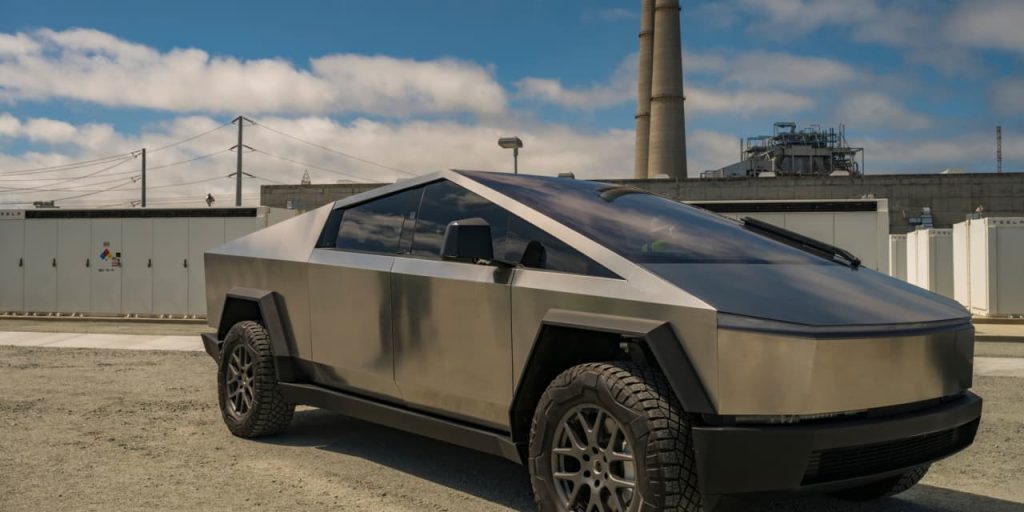Electric-vehicle giant
Tesla
reported third-quarter results on Wednesday evening that missed Wall Street estimates, underscoring that the pain of price cuts isn’t over. Tesla’s travails show that it will be tough going for traditional auto makers trying to build competing EV businesses.
Shares fluctuated around break even before the 5:30 p.m. conference call. They turned lower after CEO Elon Musk started talking. He sounded gloomy about just about everything, including Cybertruck deliveries, interest rates, and growth: “Tesla is an incredibly capable ship,” he said, adding “even a great ship in a storm has challenges.”
Shares were down about 3% around 6 p.m. Eastern time. The after-hours move came after a tough day. Tesla shares fell almost 5% in regular trading, closing at $242.68.
For the headline numbers, Tesla (ticker TSLA) reported adjusted earnings per share of 66 cents from sales of $23.4 billion. Wall Street was looking for about 70 cents a share and $23.9 billion in sales. Tesla reported $1.05 a share from sales of $21.5 billion in the third quarter of 2022.
Automotive gross profit margins excluding sales of regulatory credits came in at 16.3%, below the roughly 17.5% that Wall Street had projected. Gross profits came in at almost 27% in the third quarter of 2022.
Operating profit margins came in at 7.6%, down almost 10 percentage points year over year.
The reason for weaker profitability isn’t hard to figure out. Tesla has cut prices—significantly—several times in the past few months to help drive more sales volume as interest rates rose, the economy slowed, and EV competition heated up.
Automotive sales divided by delivered vehicles, a proxy for average price, came in at about $44,000 in the third quarter, down about $10,000 year over year. Cutting prices, to some extent, has worked. Volumes have jumped about 45% year over year.
Lower prices haven’t only hit Tesla. It’s impacting the entire industry.
General Motors
(GM) delayed a $4 billion plant upgrade on Tuesday, citing evolving EV demand and profitability. And
Ford Motor
(F) recently announced it will reduce production of its F-150 Lighting electric pickup trucks.
It’s a conservative approach amid rising interest rates and a slowing economy, and a view Musk seems to share. “I am worried about the high interest rate environment that we are in,” he said. “I can’t emphasize this enough…the vast majority of people buying a car is about the monthly payment.”
Musk added that the construction of Tesla’s Mexico plant could be impacted by the economy. Tesla still expects to ship 1.8 million units in 2023, which implies at least 475,000 units for the fourth quarter, but Musk also acknowledged that Tesla can’t grow volumes at 50% forever. That might seem obvious, but Tesla’s goal in recent years has been to grow volumes at 50% on average for the foreseeable future.
Musk was also taciturn about his coming pickup truck. “I just want to temper expectations on Cybertruck.” Some deliveries are expected in 2023, but it will take 12 to 18 months before it is a significant profit contributor, he said. Musk doesn’t expect to produce 250,000 units in a year until 2025. That isn’t too far off Wall Street estimates, but it still isn’t a bullish update.
Tesla continues to invest in AI and autonomous driving software. Tesla cut the price of its Full Self Driving driver assistance product to $12,000 from $15,000 in September. “We expect higher FSD uptake given the $3,000 price cut which would be accretive to total company margins despite being priced lower,” said Ivana Delevska, chief investment officer of Spear Invest.
Options markets imply the stock will move about 6%, up or down, following earnings. Tesla stock has moved an average of about 9%, following the past four quarterly reports. The stock has dropped three times and risen once.
Coming into Wednesday trading, Tesla stock was up about 16% over the past 12 months while the
S&P 500
and
Nasdaq Composite
were up about 18% and 26%, respectively. Its shares were down 0.6% in premarket trading Wednesday.
Write to Al Root at [email protected]
Read the full article here





